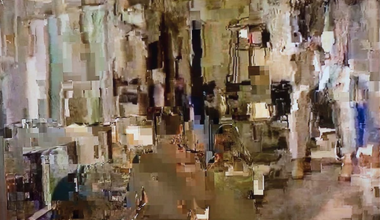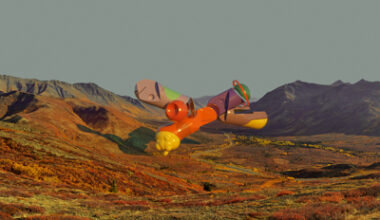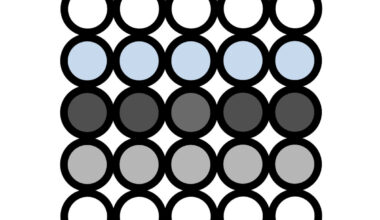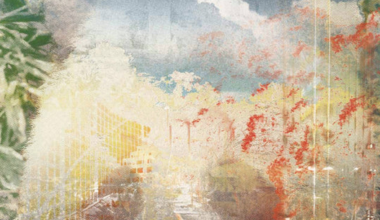Starmus Earth, Bratislava
There are about 40 people in this car park in Bratislava. One of them is astrophysicist and guitar slinger Brian May, PhD. He’s just behind us, sitting in front of a mixing desk peering at a stage where Jean-Michel Jarre is rehearsing for tomorrow night’s show. I say stage, but that would be to undersell the construction he’s designed around himself. It’s a mega city-eating spectacular, a vast construction of hi-tech scaffolding with integrated lighting and LED screens, the sort of thing of which he is the undisputed master.
Brian, instantly recognisable with his shock of steel grey curls, may even be using binoculars, it’s difficult to tell – it’s a bit dark and I don’t like to stare. Towering above us to our right is The Slovak National Uprising Bridge (or Most SNP), aka Nový Most (New Bridge), as it descends to the south bank of the Danube. The bridge is somehow suspended from an 85-metre tall pylon with a flying saucer-shaped building on top of it, which gives its third and best name; UFO Bridge. It’s a top notch example of Warsaw Pact-era architectural technology, circa 1972 and is incorporated into the stage set up. There are lasers firing from it, and the whole thing flashes in different colours thanks to arrays of powerful lights discreetly tucked away near its base.
Bratislava, the capital of Slovakia, is 80 km downstream from Vienna. In a collision of geography and geo-politics that is always a bit of a surprise to us island-dwelling Brits, it feels like one of the lasers burning through the warm night sky might be seen simultaneously in several of the countries that border Slovakia. Austria is just five kms away, Hungary is a few kms further to the south and Czechia is about 45 minutes by car. Slovakia also borders Ukraine and Poland. But there’s no seaside.
On the stage, Jean-Michel is going through the paces of his spectacular live show, a dry run before the real deal tomorrow night. He’s surrounded by synthesisers, including some EMS gear, a piece of kit so fragile, elderly and valuable it’s a miracle it’s allowed out of a museum-grade secure environment it’s surely kept in.

Tomorrow night 100,000 citizens of Bratislava will be here, with millions more watching on TV stations across Europe and online, treated to a free concert as part of the Starmus Earth event, a science ’n’ music festival co-founded by Brian May. But tonight this spectacular is just for the technical team, the camera crews, the musicians and your humble Electronic Sound scribe. Oh, and few hundred locals who have perched themselves at various publicly accessible vantage points around the venue. They cheer wildly after every song, making it almost feel like a real gig, until the 10pm sound curfew kicks in and the volume drops dramatically.
As a drone light show swarms over the stage, buzzing furiously as it rearranges itself into dizzily impressive three-dimensional cubes and spheres, projection mapping dances crazily on the Woods & Company/O2 tower block on the south bank of the river, turning it into a Bladrunner sci-fi entity, Brian May, dressed in attention-grabbing jacket made of mirrors, stalks onto the stage to accompany Jarre and the trombone section of Slovakia National Orchestra and singers for a rendition of a piece called ‘Render-vous Bratislava’.
“Tomorrow night, there will be fireworks, too,” Jarre’s PR tells me. Of course there will be fireworks. Because it’s not quite epic enough already. Next they’ll be telling us that Jarre arrived at the festival in a flying car. Oh wait, he did.
Starmus was co-founded by Brian May and tags itself as a global festival of science communication and art that brings together the most brilliant minds on the planet. That’s no idle boast. Its advisory board includes astrophysicists, the co-inventor of the iPhone, a Nobel Laureate, Richard Dawkins, Jane Goodall and, until his death in 2018, Stephen Hawking. This is the seventh edition of the festival. The first Starmus festival was in 2011 in the Canary Islands. Neil Armstrong and Buzz Aldrin gave talks at that one, alongside Soviet-era cosmonauts Alexei Leonov and Viktor Gorbatko. The music came courtesy of Tangerine Dream and Brian May. This year’s theme is ‘The Future Of Our Home Planet’, with talks, panels and lectures about how humanity can tackle the climate emergency, peppered with music events. As Stephen Hawking put it: “It is a combination of science and rock music, both of which I love. Starmus confirms its position as a unique debating chamber for the future of the human race.”
And this year, after previous festivals in Trondheim, Zurich and Yerevan in Armenia, Starmus comes to Bratislava, a city possibly overlooked on the touring circuit, which is buzzing with Starmus energy. It’s a small city with a big history. Castles and other impressive buildings from its Austro-Hungarian heyday are packed into an old town quarter of narrow cobbled streets and architectural wonders at every turn. The weather is perfect and the city’s restaurant and cafés are doing roaring trades. Buskers and flower sellers complete the Mitteleuropa idyll.

It’s show day, and people are streaming across the bridge and into the makeshift arena. By 8pm it’s full, and crowds are being directed to start filling up the bridge itself. At 9pm on the dot, a countdown begins, Jean-Michel appears, waves, and jogs to his synth collection. He’s assisted tonight by two players, one on percussion and synths, and another on violin, bass, didgeridoo and sundry other instruments.
The concert starts in the key of epic major with several blasts of synth, preparatory calls to action for a couple off hours of faultless electronic entertainment. A handful of ‘Oxygene’ variations get an airing, along with ‘Rendez-vous’, one of which accompanied the ITV coverage of the 1998 FIFA World Cup. France, in case you need reminding, beat Brazil in the final 3-0.

The ‘Rendez Vous Bratislava’ piece goes down a storm, the trombones and voices creating a stirring experience somewhere between the outrageous brass-propulsion of Anna Meredith’s ‘Nautilus’ and the choral avant-garde strangeness of Pink Floyd’s ‘Atom Heart Mother’. Brian May, who has decided not to wear his jacket of many mirrors tonight, comes on with his instantly recognisable guitar and its even more instantly recognisable multi-layered sound, and the crowd has a collective meltdown. It all settles into a calming yet extravagant rock god guitar and synth version of local lad Dvorak’s ‘New World Symphony’.
Next, the Berlin techno of ‘Azimuth’ takes the temperature up a notch, followed by ‘Exit’, a collaboration with Edward Snowden where the spy/whistleblower issues grave warnings about digital privacy from his Moscow bolthole. There’s a spiky version of 2018’s ‘Herbaliser’ which segues into ‘Oxygene 19’, followed by the relentlessly uplifting collaboration with M83, ‘Glory’ and its startling footage of mass calisthenics. As the immediately recognisable ‘Rendez Vous 4’ starts up, which may as well be some kind of Earth Anthem at this point, more fireworks explode in the sky.

It can only be topped by, say, a duo of Jarre on the laser harp and a Brian May shred-a-thon. Luckily this is exactly what happens next. As the pair muscle their way through ‘Bratislava Time’, green lasers shoot from every direction, creating a vast cat’s cradle of pulses overheard in a manner which would surely be illegal in several EU countries, but not this one. The whole magnificent shooting match is so perfectly rendered that when Brian May takes the mic to celebrate the genius of ‘Jean-Paul Jarre’, it just feels like a perfect cherry on top of the synth cake. Jarre laughs his socks off as May corrects himself.
Jean-Michel Jarre’s journey from GRM student of Pierre Schaeffer in 1969 to undisputed overlord of the international electronic live event is an extraordinary one. No one has done more to make electronic music such a global phenomenon. At its root is his commitment technological advance alongside a deep musicality. At Starmus, his show was a call to unite mankind in an effort to take better care of our home planet. Just a couple of days after the concert, there was an assassination attempt on the Slovakian prime minister, Robert Rico. This heinous act of violence was in stark contrast to the sense of togetherness Jarre’s concert engendered, but underlines the importance of music as a force for good in a darkening world.







